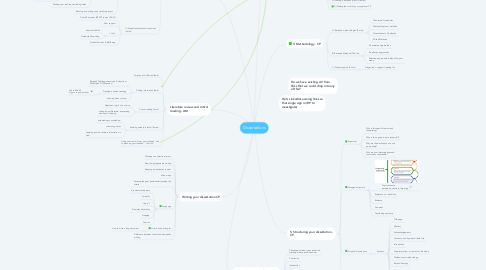
1. 1. Getting started - RP
1.1. A) Purpose of Dissertation (7 mins)
1.1.1. What is a Dissertation?
1.1.2. What are you being asked to do?
1.1.3. Why are you being asked to do this?
1.1.4. What skills are you developing / demonstrating?
1.2. B) Managing the dissertation process (8 mins)
1.2.1. Setting goals
1.2.1.1. What to do and when to do it?
1.2.1.2. Create a timeline, managing dependencies
1.2.2. Setting foundations
1.2.2.1. Create a healthy schedule
1.2.2.2. Check your digital skills
1.2.2.2.1. Saving files
1.2.2.2.2. Word for Long Documents
1.2.2.2.3. Bibliographic software
1.2.2.2.4. Time management apps
1.2.2.3. Tracking your reading and taking notes
1.2.3. Reading and writing as an iterative process
1.3. C) Support networks and resources (3 mins)
1.3.1. Online Resources (KEATS course / KASL)
1.3.2. Peer support
1.3.3. 1 to 1s
1.3.3.1. Academic Skills
1.3.3.2. Databases Searching
1.3.4. Student Services & Wellbeing
2. Literature review and critical reading - AM
2.1. Purpose of Lit Review (2min)
2.2. Finding information (6min)
2.2.1. Research Challenges exercise. Adapt from Wisker (see CUSP session)
2.2.2. Develop a search strategy.
2.2.2.1. link to KLASS Sign in to your account
2.2.3. knowing when to stop
2.3. Critical reading (6 min)
2.3.1. Questions to ask of a source
2.3.2. writing about literature - expressing views and critiquing
2.4. Making notes (dis focus) (4 mins)
2.4.1. notemaking vs notetaking.
2.4.2. structuring notes
2.4.3. keeping records of where information is from
2.5. Using sources to inform your research - link to planning your research.... (2 mins)
3. 6. Wrapping up your dissertation - AM
3.1. Check against what you need to do (marking criteria, handbook etc)
3.2. Conclusion
3.3. Introduction
3.4. Editing
3.4.1. Proof-reading
3.4.2. cutting length
3.4.3. emphasis
3.5. Formatting
3.6. sense checking
4. Writing your dissertation CP
4.1. Writing as an iterative process
4.2. Free writing/generative writing
4.3. Keeping a dissertation journal
4.4. Mind maps
4.5. Knowing the goal posts/understanding the criteria
4.6. Language
4.6.1. Academic vocabulary
4.6.2. Formality
4.6.3. Using 'I'
4.6.4. Promotes objectivity
4.6.5. Hedging
4.6.6. Concise
4.7. How to write a chapter
4.7.1. How to write a long document
4.8. Difference between critical and descriptive writing
5. 2. Planning your research - RP / CP
5.1. A) Your research question (6 mins)
5.1.1. Choosing your own research topic / question
5.1.2. Clarifying your topic/ research question (8 mins)
5.1.2.1. Information Literacy - How to clarify your topic
5.1.2.2. Research Models - Patchwork and Funnel model (link to Lit Review)
5.2. B) Techniques for thinking through ideas [RP]
5.2.1. Speaking as thinking
5.2.2. Writing as thinking (Generative Writing)
5.2.3. Mindmapping
5.3. C) Creating a Research plan [CP]6 mins)
5.4. D) Making the most of your supervisor CP
6. 4. Methodology - CP
6.1. A) Research methodologies (8 mins)
6.1.1. Theoretical frameworks
6.1.2. Methodologies vs methods
6.1.3. Quantitative vs Qualitative
6.1.4. Mixed Methods
6.2. B) Research Methods (10 mins)
6.2.1. Quantitative Approaches
6.2.2. Qualitative approaches
6.2.3. Selecting appropriate methods for your study
6.3. C) Further support (2 mins)
6.3.1. Diagnostic > support/ reading list
7. 5. Structuring your dissertation - CP
7.1. Argument
7.1.1. Why is this specific topic worth researching?
7.1.2. Why is this a good way to research it?
7.1.3. Why are the methods you've use appropriate?
7.1.4. Why are your interpretations and conclusions reasonable?
7.2. Paragraph structure
7.2.1. Topic sentence paragraph_structure_large.jpg
7.2.2. Explanation or definition
7.2.3. Evidence
7.2.4. Comment
7.2.5. Concluding sentence
7.3. Empirical disserations
7.3.1. Sections
7.3.1.1. Title page
7.3.1.2. Abstract
7.3.1.3. Acknowledgements
7.3.1.4. Contents, and figure and table lists
7.3.1.5. Introduction
7.3.1.6. Literature review, or context of the study
7.3.1.7. Methods and methodology
7.3.1.8. Results/Findings
7.3.1.9. Discussion
7.3.1.10. Conclusions
7.3.1.11. References
7.4. Non-empirical dissertations (Rosa's documentation)
7.4.1. Sections
7.4.1.1. Introduction
7.4.1.1.1. Texts and contexts
7.4.1.1.2. Relevant literature
7.4.1.1.3. Research question
7.4.1.1.4. Method
7.4.1.1.5. Purpose
7.4.1.1.6. Structure
7.4.1.2. Chapters
7.4.1.3. Conclusion/Coda
7.4.1.4. Bibliography
